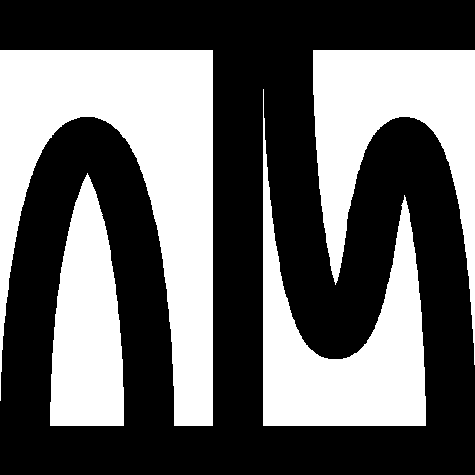:: AMI_4 semantic presentation 
 :: Showing IDV graph ... (Click the Palm Trees again to close it)
:: Showing IDV graph ... (Click the Palm Trees again to close it)
theorem Th1: :: AMI_4:1 
 :: Showing IDV graph ... (Click the Palm Tree again to close it)
:: Showing IDV graph ... (Click the Palm Tree again to close it) 
theorem Th2: :: AMI_4:2 
 :: Showing IDV graph ... (Click the Palm Tree again to close it)
:: Showing IDV graph ... (Click the Palm Tree again to close it) 
scheme :: AMI_4:sch 1
Euklides'{
F1(
Nat)
-> Nat,
F2(
Nat)
-> Nat,
F3()
-> Nat,
F4()
-> Nat } :
ex
k being
Nat st
(
F1(
k)
= F3()
hcf F4() &
F2(
k)
= 0 )
provided
A1:
0
< F4()
and A2:
F4()
< F3()
and A3:
F1(0)
= F3()
and A4:
F2(0)
= F4()
and A5:
for
k being
Nat st
F2(
k)
> 0 holds
(
F1(
(k + 1))
= F2(
k) &
F2(
(k + 1))
= F1(
k)
mod F2(
k) )
set a = dl. 0;
set b = dl. 1;
set c = dl. 2;
:: deftheorem defines Euclide-Algorithm AMI_4:def 1 :
defpred S1[ State of SCM ] means ( $1 . (il. 0) = (dl. 2) := (dl. 1) & $1 . (il. 1) = Divide (dl. 0),(dl. 1) & $1 . (il. 2) = (dl. 0) := (dl. 2) & $1 . (il. 3) = (dl. 1) >0_goto (il. 0) & $1 halts_at il. 4 );
set IN0 = (il. 0) .--> ((dl. 2) := (dl. 1));
set IN1 = (il. 1) .--> (Divide (dl. 0),(dl. 1));
set IN2 = (il. 2) .--> ((dl. 0) := (dl. 2));
set IN3 = (il. 3) .--> ((dl. 1) >0_goto (il. 0));
set IN4 = (il. 4) .--> (halt SCM );
set EA3 = ((il. 3) .--> ((dl. 1) >0_goto (il. 0))) +* ((il. 4) .--> (halt SCM ));
set EA2 = ((il. 2) .--> ((dl. 0) := (dl. 2))) +* (((il. 3) .--> ((dl. 1) >0_goto (il. 0))) +* ((il. 4) .--> (halt SCM )));
set EA1 = ((il. 1) .--> (Divide (dl. 0),(dl. 1))) +* (((il. 2) .--> ((dl. 0) := (dl. 2))) +* (((il. 3) .--> ((dl. 1) >0_goto (il. 0))) +* ((il. 4) .--> (halt SCM ))));
set EA0 = ((il. 0) .--> ((dl. 2) := (dl. 1))) +* (((il. 1) .--> (Divide (dl. 0),(dl. 1))) +* (((il. 2) .--> ((dl. 0) := (dl. 2))) +* (((il. 3) .--> ((dl. 1) >0_goto (il. 0))) +* ((il. 4) .--> (halt SCM )))));
theorem :: AMI_4:3 
 :: Showing IDV graph ... (Click the Palm Tree again to close it)
:: Showing IDV graph ... (Click the Palm Tree again to close it) 
canceled;
theorem Th4: :: AMI_4:4 
 :: Showing IDV graph ... (Click the Palm Tree again to close it)
:: Showing IDV graph ... (Click the Palm Tree again to close it) 
Lm1:
for s being State of SCM st Euclide-Algorithm c= s holds
S1[s]
theorem Th5: :: AMI_4:5 
 :: Showing IDV graph ... (Click the Palm Tree again to close it)
:: Showing IDV graph ... (Click the Palm Tree again to close it) 
theorem Th6: :: AMI_4:6 
 :: Showing IDV graph ... (Click the Palm Tree again to close it)
:: Showing IDV graph ... (Click the Palm Tree again to close it) 
theorem Th7: :: AMI_4:7 
 :: Showing IDV graph ... (Click the Palm Tree again to close it)
:: Showing IDV graph ... (Click the Palm Tree again to close it) 
theorem Th8: :: AMI_4:8 
 :: Showing IDV graph ... (Click the Palm Tree again to close it)
:: Showing IDV graph ... (Click the Palm Tree again to close it) 
theorem Th9: :: AMI_4:9 
 :: Showing IDV graph ... (Click the Palm Tree again to close it)
:: Showing IDV graph ... (Click the Palm Tree again to close it) 
Lm2:
for k being Nat
for s being State of SCM st s starts_at il. 0 & Euclide-Algorithm c= s & s . (dl. 0) > 0 & s . (dl. 1) > 0 holds
( ((Computation s) . (4 * k)) . (dl. 0) > 0 & ( ( ((Computation s) . (4 * k)) . (dl. 1) > 0 & IC ((Computation s) . (4 * k)) = il. 0 ) or ( ((Computation s) . (4 * k)) . (dl. 1) = 0 & IC ((Computation s) . (4 * k)) = il. 4 ) ) )
Lm3:
for k being Nat
for s being State of SCM st s starts_at il. 0 & Euclide-Algorithm c= s & s . (dl. 0) > 0 & s . (dl. 1) > 0 & ((Computation s) . (4 * k)) . (dl. 1) > 0 holds
( ((Computation s) . (4 * (k + 1))) . (dl. 0) = ((Computation s) . (4 * k)) . (dl. 1) & ((Computation s) . (4 * (k + 1))) . (dl. 1) = (((Computation s) . (4 * k)) . (dl. 0)) mod (((Computation s) . (4 * k)) . (dl. 1)) )
Lm4:
for s being State of SCM st s starts_at il. 0 & Euclide-Algorithm c= s holds
for x, y being Integer st s . (dl. 0) = x & s . (dl. 1) = y & x > y & y > 0 holds
( (Result s) . (dl. 0) = x gcd y & ex k being Nat st s halts_at IC ((Computation s) . k) )
theorem Th10: :: AMI_4:10 
 :: Showing IDV graph ... (Click the Palm Tree again to close it)
:: Showing IDV graph ... (Click the Palm Tree again to close it) 
definition
func Euclide-Function -> PartFunc of
FinPartSt SCM ,
FinPartSt SCM means :
Def2:
:: AMI_4:def 2
for
p,
q being
FinPartState of
SCM holds
(
[p,q] in it iff ex
x,
y being
Integer st
(
x > 0 &
y > 0 &
p = (dl. 0),
(dl. 1) --> x,
y &
q = (dl. 0) .--> (x gcd y) ) );
existence
ex b1 being PartFunc of FinPartSt SCM , FinPartSt SCM st
for p, q being FinPartState of SCM holds
( [p,q] in b1 iff ex x, y being Integer st
( x > 0 & y > 0 & p = (dl. 0),(dl. 1) --> x,y & q = (dl. 0) .--> (x gcd y) ) )
uniqueness
for b1, b2 being PartFunc of FinPartSt SCM , FinPartSt SCM st ( for p, q being FinPartState of SCM holds
( [p,q] in b1 iff ex x, y being Integer st
( x > 0 & y > 0 & p = (dl. 0),(dl. 1) --> x,y & q = (dl. 0) .--> (x gcd y) ) ) ) & ( for p, q being FinPartState of SCM holds
( [p,q] in b2 iff ex x, y being Integer st
( x > 0 & y > 0 & p = (dl. 0),(dl. 1) --> x,y & q = (dl. 0) .--> (x gcd y) ) ) ) holds
b1 = b2
end;
:: deftheorem Def2 defines Euclide-Function AMI_4:def 2 :
theorem Th11: :: AMI_4:11 
 :: Showing IDV graph ... (Click the Palm Tree again to close it)
:: Showing IDV graph ... (Click the Palm Tree again to close it) 
theorem Th12: :: AMI_4:12 
 :: Showing IDV graph ... (Click the Palm Tree again to close it)
:: Showing IDV graph ... (Click the Palm Tree again to close it) 
theorem :: AMI_4:13 
 :: Showing IDV graph ... (Click the Palm Tree again to close it)
:: Showing IDV graph ... (Click the Palm Tree again to close it) 













